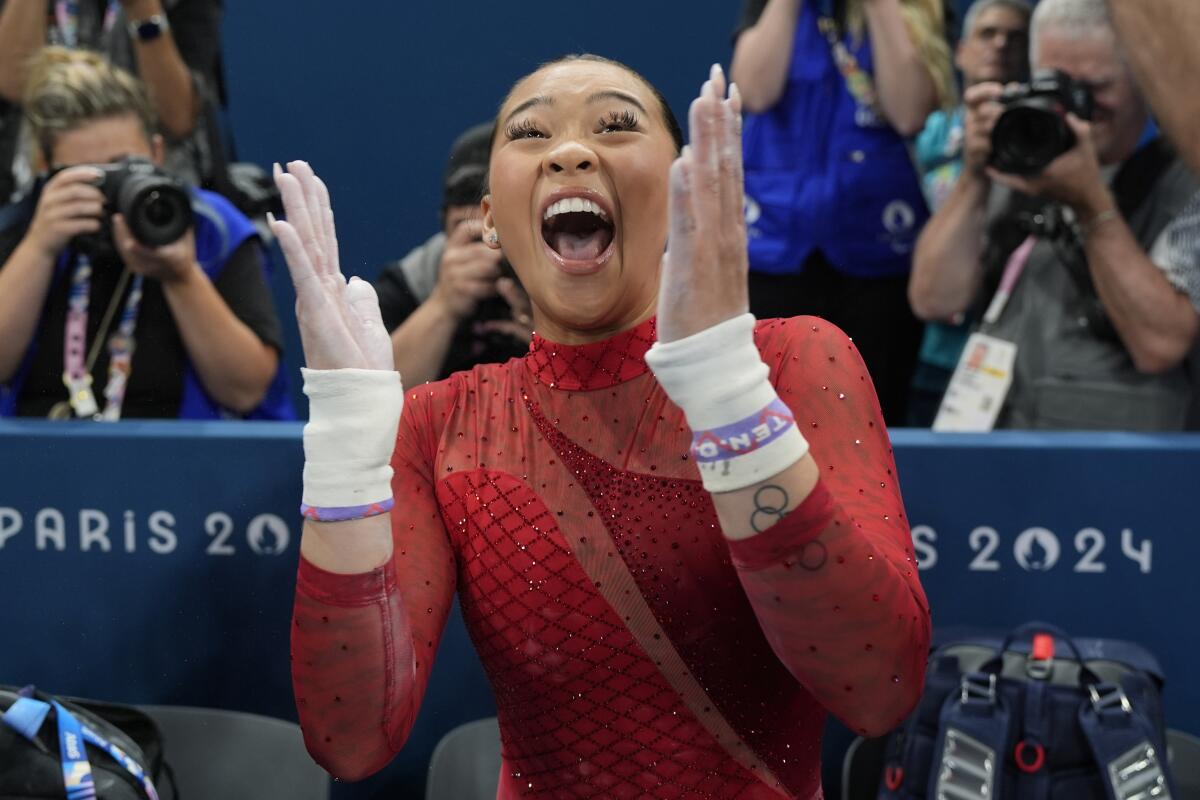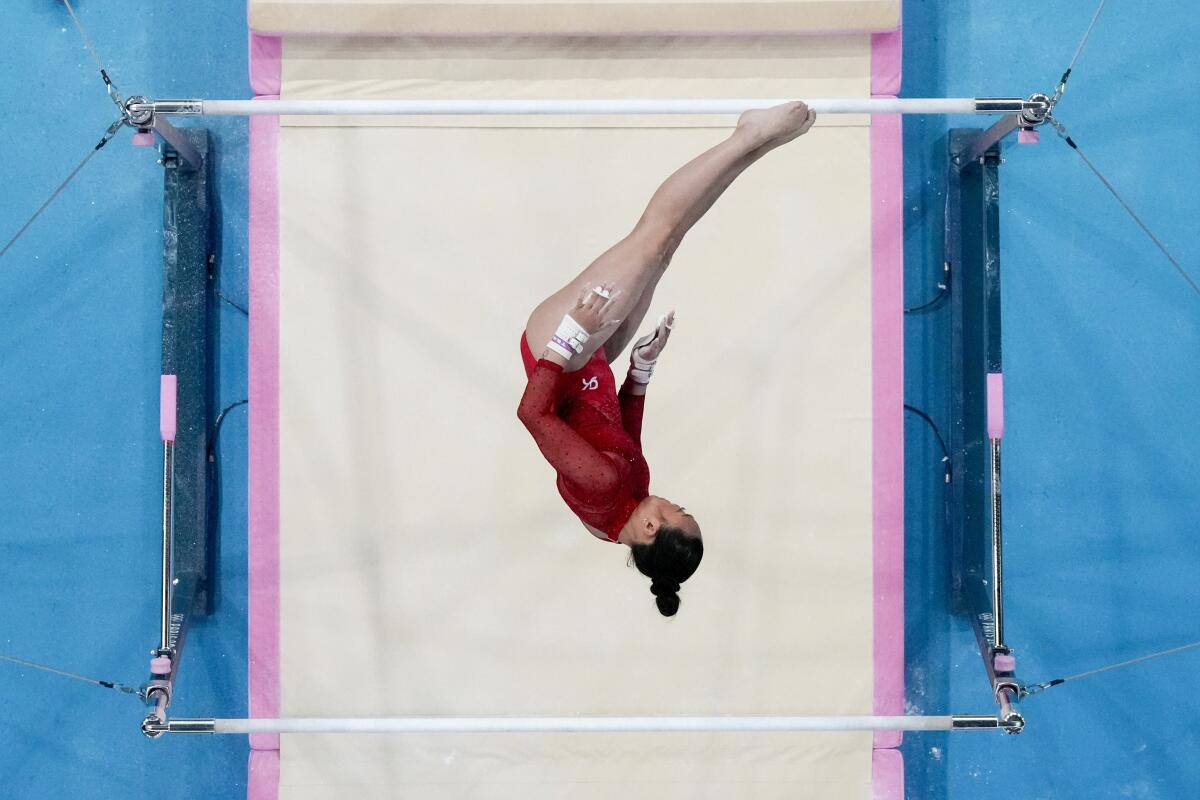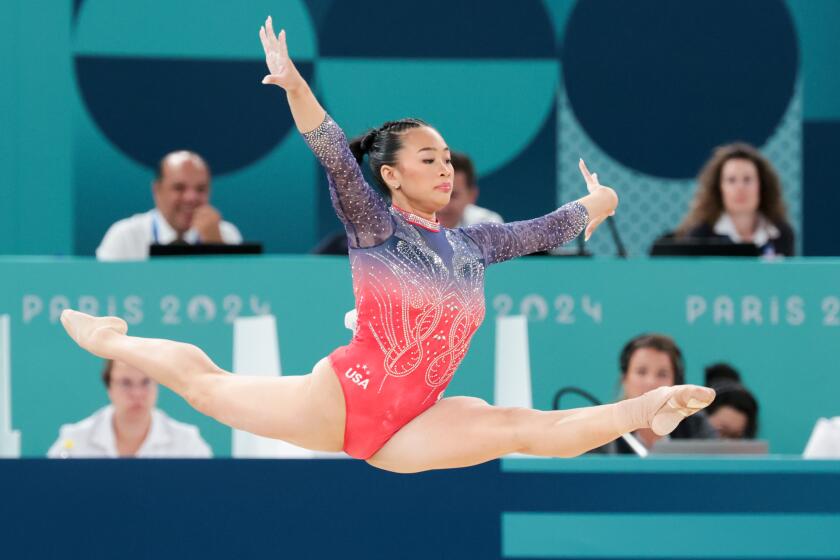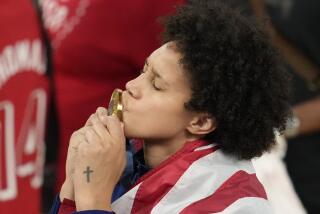Suni Lee adds to her Paris medal count, taking bronze on the uneven bars

- Share via
PARIS — The routine is similar. The medal color is identical. But Suni Lee’s mindset is different.
The 21-year-old earned her redemption on bars on Sunday, winning the bronze medal in the event final by delivering the clean routine that evaded her three years ago in Tokyo. Lee now has three medals from these Games including her team gold and all-around bronze. She has six total Olympic medals and two consecutive bronze medals on uneven bars. She is the first American woman to win back-to-back Olympic medals on the same event since Aly Raisman on floor in 2012 and 2016.
While she achieved the highest individual honor in the sport, winning all-around gold in Tokyo, her favorite medals are the ones she won here in Paris. It’s where she has been able to compete with a smile on her face every night and win with her teammates by her side.
Suni Lee was ready to quit gymnastics amid an ongoing battle with kidney diseases. Her decision to not give up has paid off in gold and bronze medals.
“I’m just learning to give myself so much grace,” said Lee, who pointed out that she was visibly disappointed with subpar turns during the last Olympics. “This time, I’m like, we weren’t even supposed to be here. So everything that I’m doing now, I’m like, wow, this is just so much better than last time and gymnastics is a lot more fun.”
After being diagnosed with two kidney diseases and hearing she would never do gymnastics again, Lee has taken a mindset of gratitude for the Paris Olympics. She was disappointed in Tokyo after missing several connections during the event final. Using a similar routine, Lee nailed the transition between her first high bar release skill straight down to the low bar on Thursday to score 14.800. Three of her four bars performances in Paris have earned scores of 14.800 or better.
Lee edged out defending Olympic gold medalist Nina Derwael for third place by 0.034 points. When the American’s score flashed across the screen, Lee flinched in surprise and covered her mouth with both of her chalk-covered hands.
While she was a gold-medal favorite in Tokyo, Lee knew that with the difficulty of other routines, bronze appeared to be her best shot. Gold medalist Kaylia Nemour from Algeria and Chinese silver medalist Qiu Qiyuan ran away with the competition with routines that began with at least seven-tenths more points in difficulty than the next closest competitor. Nemour, the first African gymnast to win an Olympic medal, not only tied with Qiu for the highest difficulty (7.2) but also had the best execution score of the eight-athlete final to record a whopping 15.700. Qiu finished second with 15.500.
The last competitor to go, Lee paced on the sideline at the end of the seating area during the competition. She watched almost every routine. As Nemour started gaining momentum when she connected complicated release skills from the high bar, down to the low bar and back up, Lee was jumping up and down. When Nemour stuck her double layout dismount, Lee’s jaw dropped and she clapped up a cloud of chalk.

“She gets up there and just looks like a feather flying over the bar,” Lee said. “She’s just so beautiful to watch.”
Usually Lee wouldn’t watch her other competitors. Maybe when she competes in the balance beam final on Monday — her last performance of these Olympics — she won’t. But she knew she couldn’t miss the quality of this bar final, and after Tokyo, her mindset isn’t the only thing that’s changed in gymnastics.
“You can look back and see like a lot of the girls not really having a lot of fun and just like not smiling,” Lee said. “This time, we’re celebrating after every turn, going up and hugging everybody. And it just makes it so much fun. Because I think it goes so much deeper than gymnastics, you create these long-term friendships and people that I’m going to be supporting.”
More to Read
Go beyond the scoreboard
Get the latest on L.A.'s teams in the daily Sports Report newsletter.
You may occasionally receive promotional content from the Los Angeles Times.








